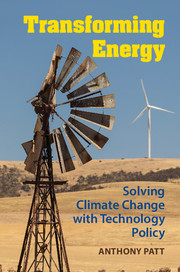Book contents
- Frontmatter
- Dedication
- Contents
- Foreword
- Acknowledgments
- PART 1 SETTING THE STAGE
- PART 2 FAILED STRATEGIES TO REDUCE EMISSIONS
- PART 3 SUCCESSFUL STRATEGIES TO MOVE US AWAY FROM FOSSIL FUELS
- 7 Theories of transitions
- 8 Strategic technologies
- 9 Energiewende in the German power sector
- 10 Policies beyond power
- 11 Pulling it all together
- Notes
- Index
8 - Strategic technologies
from PART 3 - SUCCESSFUL STRATEGIES TO MOVE US AWAY FROM FOSSIL FUELS
Published online by Cambridge University Press: 05 July 2015
- Frontmatter
- Dedication
- Contents
- Foreword
- Acknowledgments
- PART 1 SETTING THE STAGE
- PART 2 FAILED STRATEGIES TO REDUCE EMISSIONS
- PART 3 SUCCESSFUL STRATEGIES TO MOVE US AWAY FROM FOSSIL FUELS
- 7 Theories of transitions
- 8 Strategic technologies
- 9 Energiewende in the German power sector
- 10 Policies beyond power
- 11 Pulling it all together
- Notes
- Index
Summary
I have mentioned the Intergovernmental Panel on Climate Change (IPCC) several times in this book. At the most general level, the IPCC reviews the science of climate change – thousands of scientific articles published every year – and synthesize it in a manner that makes sense for policy makers. But to synthesize information, it is necessary to organize it around some sort of framework and that in turn requires a judgment call. In its most recent assessment, the Working Group III report, which covers climate mitigation and mitigation policy, one of the critical questions was whether to frame the mitigation challenge primarily around the intellectual framework of the global commons (and hence, implicitly, externalities) or around that of the technological transition. There were debates among a select group of authors culminating at a week-long plenary meeting in Berlin in April 2014, where national representatives needed to approve the report's Summary for Policymakers, known as the SPM.
I was a member of the SPM writing team, and it should come as no surprise that I was part of the small faction within the SPM writing team suggesting that we place greater emphasis on the transition framing. Ultimately, the SPM draft that the authors asked policy makers to approve presented both framings. What surprised many of us was what happened next. The policy makers turned out to be far more receptive of the transitions framing than of the global commons problem framing. Indeed, several countries, as a precondition to their signing off, more or less forced us, the authors, to remove the references to the global commons.We ended up having to gut those sections of the SPM that spoke to the need for global treaty formation based on the concept of the global commons.
What's with that? The policy makers appeared unwilling to agree to language that suggested anything close to a legal and moral obligation to participate in a Kyoto-like treaty.
- Type
- Chapter
- Information
- Transforming EnergySolving Climate Change with Technology Policy, pp. 176 - 224Publisher: Cambridge University PressPrint publication year: 2015



